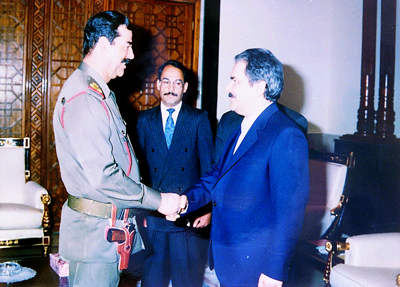| Relatives of the victims of the terrorist Mojahedin-e Khalq Organization announced that they plan to lodge a complaint with the Iraqi judiciary against the MKO for its collaboration with Saddam's regime in the massacre of the Iraqi Kurds in 1991. |

http://english.farsnews.com/newstext.php?nn=9002310348
According to the Habilian association, a human rights group formed of the family members and relatives of the Iranian victims of terrorism, the relatives of the victims of the March 1991 Intifada against the former Iraqi regime reiterated that the MKO had collaborated with the Baath regime in suppressing and massacring their beloved ones.
"We have evidence and documents which prove that they had carried out this action and we will present these pieces of evidence to Iraq's Judiciary to prove their crime," the families and relatives of the victims said.
According to the US Department of State and the Foreign Affairs group of the Parliament of Australia, the Iraq-based MKO is accused of having assisted the Iraqi Republican Guard in brutally suppressing the Shiites and Kurds' uprisings in 1991.
Maryam Rajavi, who assumed the leadership role of the MKO after a series of years as co-leader alongside her husband Massoud Rajavi, has been reported by former members of the MKO as having said, "Take the Kurds under your tanks, and save your bullets for the Iranian Revolutionary Guards Corps."
The MKO, whose main stronghold is in Iraq, is blacklisted by much of the international community, including the United States.
Before an overture by the EU, the MKO was on the European Union's list of terrorist organizations subject to an EU-wide assets freeze. Yet, the MKO puppet leader, Maryam Rajavi, who has residency in France, regularly visited Brussels and despite the ban enjoyed full freedom in Europe.
The MKO is behind a slew of assassinations and bombings inside Iran, a number of EU parliamentarians said in a recent letter in which they slammed a British court decision to remove the MKO from the British terror list. The EU officials also added that the group has no public support within Iran because of their role in helping Saddam Hussein in the Iraqi imposed war on Iran (1980-1988).
Many of the MKO members abandoned the terrorist organization while most of those still remaining in the camp are said to be willing to quit but are under pressure and torture not to do so.
A May 2005 Human Rights Watch report accused the MKO of running prison camps in Iraq and committing human rights violations.
According to the Human Rights Watch report, the outlawed group puts defectors under torture and jail terms.
Numerous articles and letters posted on the Internet by family members of MKO recruits confirm reports of the horrific abuse that the group inflicts on its own members and the alluring recruitment methods it uses.
The most shocking of such stories includes accounts given by former British MKO member Ann Singleton and Mustafa Mohammadi -- the father of an Iranian-Canadian girl who was drawn into the group during an MKO recruitment campaign in Canada.
Mohammadi recounts his desperate efforts to contact his daughter, who disappeared several years ago - a result of what the MKO called a 'two-month tour' of Camp Ashraf for teenagers.
He also explains how the group forces the families of its recruits to take part in pro-MKO demonstrations in Western countries by threatening to kill their loved ones.
Lacking a foothold in Iran, the terrorist group recruits ill-informed teens from Iranian immigrant communities in Western states and blocks their departure afterwards.
The group, founded in the 1960s, blended elements of Islamism and Stalinism and participated in the overthrow of the US-backed Shah of Iran in 1979. Ahead of the revolution, the MKO conducted attacks and assassinations against both Iranian and Western targets.
Leaders of the group have been fighting to shed its terrorist tag after a series of bloody anti-Western attacks in the 1970s, and nearly 30 years of violent struggle against the Islamic Republic of Iran.
In recent months, high-ranking MKO members have been lobbying governments around the world in the hope of acknowledgement as a legitimate opposition group.
The UK initiative, however, prompted the European Union to establish relations with the exiled organization now based in Paris. The European Court of First Instance threw its weight behind the MKO in December 2009 and annulled its previous decision to freeze its funds.
The group started assassination of the citizens and officials after the revolution in a bid to take control of the newly established Islamic Republic. It killed several of Iran's new leaders in the early years after the revolution, including the then President, Mohammad Ali Rajayee, Prime Minister, Mohammad Javad Bahonar and the Judiciary Chief, Mohammad Hossein Beheshti who were killed in bomb attacks by MKO members in 1981.
The group fled to Iraq in 1986, where it was protected by Saddam Hussein and where it helped the Iraqi dictator suppress Shiite and Kurd uprisings in the country.
The terrorist group joined Saddam's army during the Iraqi imposed war on Iran (1980-1988) and helped Saddam and killed thousands of Iranian civilians and soldiers during the US-backed Iraqi imposed war on Iran.
Since the 2003 US invasion of Iraq, the group, which now adheres to a pro-free-market philosophy, has been strongly backed by neo-conservatives in the United States, who also argue for the MKO to be taken off the US terror list.
The MKO has been in Iraq's Diyala province since the 1980s.
Iraqi security forces took control of the training base of the MKO at Camp Ashraf - about 60km (37 miles) north of Baghdad - in 2009 and detained dozens of the members of the terrorist group.
The Iraqi authority also changed the name of the military center from Camp Ashraf to the Camp of New Iraq.
